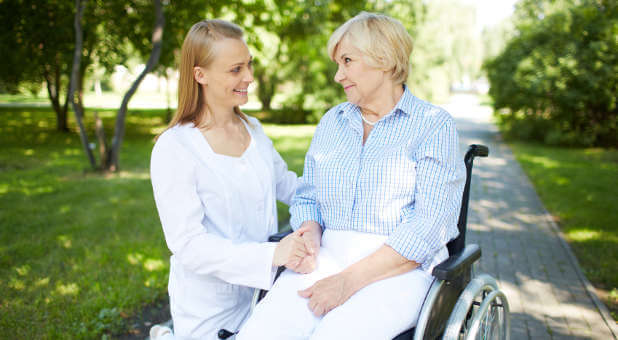The Christian approach to pain, suffering and sickness is compassion, mercy, tenderness and caring. Matthew records, “But when He saw the crowds, He was moved with compassion for them, because they fainted and were scattered, like sheep without a shepherd” (Matt. 9:36).
- He didn’t write off their illness as an illusion.
- He didn’t blame them for their illness.
- He didn’t discourage them or tell them to give up.
He had compassion. And if you’re going to be like Jesus, you have to learn to be compassionate toward people when they’re sick.
Millions of people are suffering unnecessarily from preventable and sometimes curable diseases. Three hundred million people will contract malaria this year, but we know how to prevent it and treat it. Every day, 3000 children die of a mosquito bite.
And then there are the diseases we don’t have a cure for yet, but we’re working on it. Three million people die each year from HIV/AIDS. We don’t have the cure yet, but we do know how to prevent it.
We cannot delay. We cannot procrastinate. If we’re going to be people of compassion, we can’t wait any longer.
There are seven ingredients in caring for the sick:
1. Thoughtfulness. Before you can care, you’ve got to be aware. You have to pay attention. You have to put up your antenna. You have to start looking at people, listening to people and looking for the clues that say, “I’m in pain.”
God intentionally allows sick people in your life to give you the opportunity to learn to love. Those people are not accidentally in your life. Who’s our model for this? God. The Bible says, “God saw their misery when He heard their cry” (Ps. 106:44 NCV).
2. Presence. I was sick inside with sin. I needed God, so He showed up in my life. He offered his presence. That’s exactly what God asks us to do for each other. He wants us to give our presence to each other in moments of need.
3. Acceptance. Acceptance means removing the embarrassment someone might experience from being sick. I don’t know why, but we get embarrassed about our sicknesses. We get embarrassed about our illnesses. We don’t want people to know. But it’s not a sin to be sick. It’s not a lack of faith. It’s just part of being human.
One of the illnesses we need to destigmatize is HIV/AIDS. It’s considered a sexually transmitted disease, so people wind up feeling an extra sense of judgment and rejection when they suffer with it. Too many people have been fired, shunned and banned from organizations because of HIV/AIDS. But Jesus welcomed those stigmatized by illness into his life, and we should as well.
4. Affirmation. We need to give people living with sickness the gift of hope. People can handle almost anything in life if they have hope. One of the ways you can give people hope is through a word of encouragement.
Other ways might come through physical expressions of affection like a touch, a hug or a pat on the back to show your concern. That gives people hope.
5. Provide medicine. Medicines are a gift from God. We’re to use them. Presumption is when we ignore what God has provided. Medicines are a gift from God and you should use them without shame or without hesitance.
The Good Samaritan went out of his way to help the guy who was mugged on the side of the road and bandaged his wounds, pouring on oil and wine. He was using the best medicines he had available at that moment. He poured some alcohol on the wounds to disinfect them. Then he added oil to soothe them.
6. Prevention. Prevention is part of caring for the sick. How do you prevent sickness? You teach health habits.
Around the world, millions of people need to learn basic health habits we all take for granted. Much of the world doesn’t know that you can stay a lot healthier by just washing your hands. Another helpful idea would simply be to boil water to remove the germs. A small provision such as bed nets—mosquito nets placed over people’s beds so the mosquitoes can’t bite them—would save millions from being sick.
7. Prayer. Prayer is asking God to heal people who are sick. All healing comes from God, no matter the method He uses. He can use doctors. He can use medicine. He can use natural techniques. He can work a miracle.
God heals people many different ways. Doctors will tell you they cannot heal. They can perform procedures, but the healing has to be God doing it in your life. God uses doctors; God uses medicine; and God uses miracles.
Here’s the question: Will you do anything about this and the sick people in your life? There are sick people around you.
The Bible calls Jesus the Great Physician. He is the cure to the ailments in your life. When it comes to guilt, worry, depression, fear, bitterness, boredom, loneliness, etc., he is the great physician who heals physically, spiritually and emotionally. {eoa}
Rick Warren is the founding pastor of Saddleback Church. His book, The Purpose Driven Church, was named one of the 100 Christian books that changed the 20th century. He is also founder of pastors.com, a global Internet community for pastors.
For the original article, visit pastors.com.

